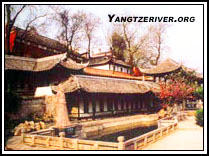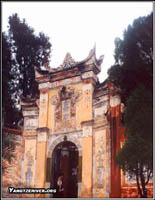Fengjie Travel Guide
Introduction
Fengjie is a famous ancient town with a history of more than 2,000 years on the northern bank of the Yangtze River in the eastern part of Chongqing. It is the first city at the western end of the Yangtze Three Gorges and situated at the entrance of Qutang Gorge. Fengjie is situated in a dangerous terrain rarely seen anywhere else. The Yangtze flows to the east in front of it, and the rivers Meixi and Caotang flow into the Yangtze from the north. Chijia and Baiyan are two mountains that stand on each side of the river. So the inscriptions said " A natural barrier of Qutang", "Throat of Sichuan", "Feasting the Eye", "Watching the Waves", "Solemn and Mighty".
According to local annals, the site Stele Garden, Baidichengof Fengjie County had been moved five times from one side of the river to the other along the section of from today's Fengjie to Kui Gate. One of the sites still can be found near BaidiCity at the northern bank of the river. It is the site of the ancient Fengjie which was renamed from Yufu to Yongan during the Three Kingdoms period (220-280). The county seat was moved westwards in the Song Dynasty (960-1279) to the present site, where it has remained ever since.

In the past, transportation was so poor that people had to carry things by shoulder or back faltering along the narrow stone paths. Fengjie has been greatly developed and it now has very good transportation and communication facilities on the river as well as over land. Ships from Fengjie go to all the ports along the river, and there are highways leading to Wushan and Enshi in HubeiProvince. And the development has made it possible for the agriculture and industry to grow rapidly. Fengjie abounds in day lily, shaddock, tangerine, orange, peach and loquat. When autumn comes, the ancient city is decorated with yellow tangerines and red oranges which present a lovely picture.
What to see
There is a great number of historical sites at Fengjie. In the city are the sites of the Yong'an Palace, where Liu Bei, emperor of the state of Shu in the Three Kingdoms period, entrusted his only son to his prime minister Zhuge Liang who was a legendary wise man (refer to "White Emperor City"); the tatched Cottage Temple, where Du fu, a great poet in the Tang Dynasty, once lived in; the tomb of Madame Gan, wife of Liu Bei.

For the natural scenery, there are "TBaidichengwelve Scenes of Fengjie" on either bank of the river. They include the "Eight-Unit Formation of Zhuge Liang", "Backwater of Yanyu", "Serried Hills at Baidi", "Glorious Sunrays on Chijia", "Morning Colors on Baiyan" and "Autumn Moon over the Gorge". All these natural scenes are composed of mountains and water, sun and moon.
Baidi City or the City of White Emperor is not a real city, but a mini city with some temples and gates on top of Baidi Hill in Fengjie County, located at the entrance of Qutang Gorge and 8 km from Fengjie County seat. Climbing over 500 steps, you can reach the top. It is the starting point of the Three Gorges and is most famous for Li Bai's great poem about the city written in the Tang Dynasty.



